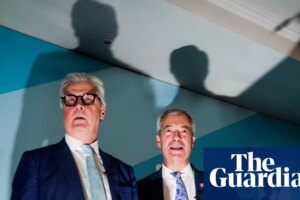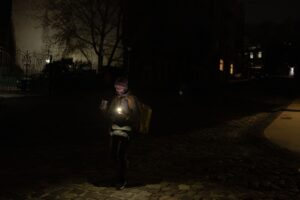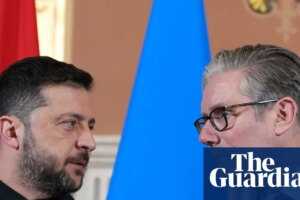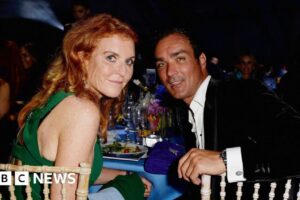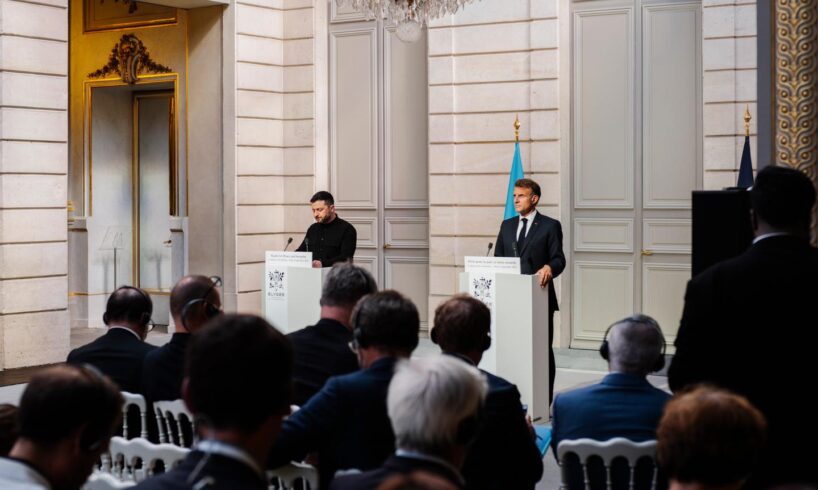
Ukrainian President Volodymyr Zelensky and Emmanuel Macron speak at a press conference after a summit of the ‘coalition of the willing,’ at the Elysée Palace in Paris, on September 4, 2025. KAMIL ZIHNIOGLU FOR LE MONDE
Over two dozen countries have pledged to take part in a force to be deployed in Ukraine after a potential peace accord is reached with Russia, aiming to deter Moscow from ever again attacking its neighbour, French President Emmanuel Macron announced on Thursday, September 4.
A “reassurance force” for Ukraine is a key pillar of the security guarantees that a coalition, mainly composed of European countries, wants to offer to Ukraine, if the war ends via a peace deal or a ceasefire. However, there is also growing concern that Russian President Vladimir Putin currently shows no interest in a peace deal, with alarm intensifying after his high-profile visit to Beijing this week.
European leaders spoke to US President Donald Trump via video conference after the summit in Paris of the so-called “coalition of the willing,” hosted by Macron and attended by Ukraine’s President Volodymyr Zelensky. The coalition of the willing includes around 30 nations that back Ukraine, mainly European countries, but also Canada, Australia and Japan.
Read more Subscribers only Zelensky and the ‘coalition of the willing’ seek Trump’s support for Ukraine at Paris meeting
Some European leaders attended in person and others, like British Prime Minister Keir Starmer, attended remotely. The United States was represented by Trump’s special envoy Steve Witkoff, who also met with Zelensky separately.
26 countries have formally committed
The meeting is a new push led by Macron to show that Europe can act independently of Washington after Trump upended US foreign policy and launched direct talks with Putin after returning to the White House. Europe has been under pressure to step up its response, after over three and a half years since Russia launched its full-scale invasion in February 2022.
Read more Subscribers only Europe is now Ukraine’s main source of military support
“We have today 26 countries who have formally committed – some others have not yet taken a position – to deploy as a ‘reassurance force’ troops in Ukraine, or be present on the ground, in the sea, or in the air,” Macron told reporters alongside Zelensky.
Macron added: “This force does not seek to wage any war on Russia. It is a force to guarantee peace.” The troops would not be deployed “on the front line” but aim to “prevent any new major aggression,” the French president said. He added that another major pillar was undertaking a “regeneration” of the Ukrainian army so that it can “not just resist a new attack but dissuade Russia from a new aggression.”
Macron also said the US was being “very clear” about its willingness to participate in security guarantees for Ukraine. However there was no clear indication that Europe had won the pledge from Washington of the security “backstop” it seeks and the American contribution remains unclear.
‘First such serious concrete step’
Zelensky hailed the move. “I think that today, for the first time in a long time, this is the first such serious concrete step,” he said.
Partner service
Learn French with Gymglish
Thanks to a daily lesson, an original story and a personalized correction, in 15 minutes per day.
Try for free
Help us improve Le Monde in English
Dear reader,
We’d love to hear your thoughts on Le Monde in English! Take this quick survey to help us improve it for you.
Take the survey
New
Le Monde’s app
Get the most out of your experience: download the app to enjoy Le Monde in English anywhere, anytime
Download
Zelensky also said he discussed sanctions on Russia and protecting Ukraine’s airspace with Trump. “We talked about how to push the situation toward real peace. We discussed different options, and the most important is pressure, using strong measures, particularly economic ones, to force an end to the war,” Zelensky said on social media.
During the summit, Starmer said it was necessary “to go even further to apply pressure on Putin to secure a cessation of hostilities,” a Downing Street spokeswoman said.
However, there were also divisions within the coalition, with German Chancellor Friedrich Merz urging more pressure but remaining cautious about the scope of involvement. “Germany will decide on military involvement at the appropriate time once the framework conditions have been clarified,” a government spokesman said after the summit.
Read more Subscribers only Merz sparks outcry over possible German military involvement to defend Ukraine
Taking a similar line, Prime Minister Giorgia Meloni reiterated at the meeting that Italy will not send troops to Ukraine, but it could help monitor any potential peace deal, her office said.
‘Governor of Texas’
Frustration has been building in the West over what leaders say is Putin’s unwillingness to strike a deal to end the conflict. Zelensky says he has not seen “any signs from Russia that they want to end the war.”
Macron warned that if Russia continued refusing a peace deal, then “additional sanctions” would be agreed in coordination with the United States.
Read more Subscribers only Ukraine must ‘turn time to its advantage’ against Putin
Before the Paris talks, Russian foreign ministry spokeswoman Maria Zakharova said Moscow would not agree to the deployment of foreign troops in Ukraine “in any format.”
“It’s not for them to decide,” NATO chief Mark Rutte shot back on Thursday. “I think we really have to stop making Putin too powerful,” Rutte added. “He’s the governor of Texas, not more.”

